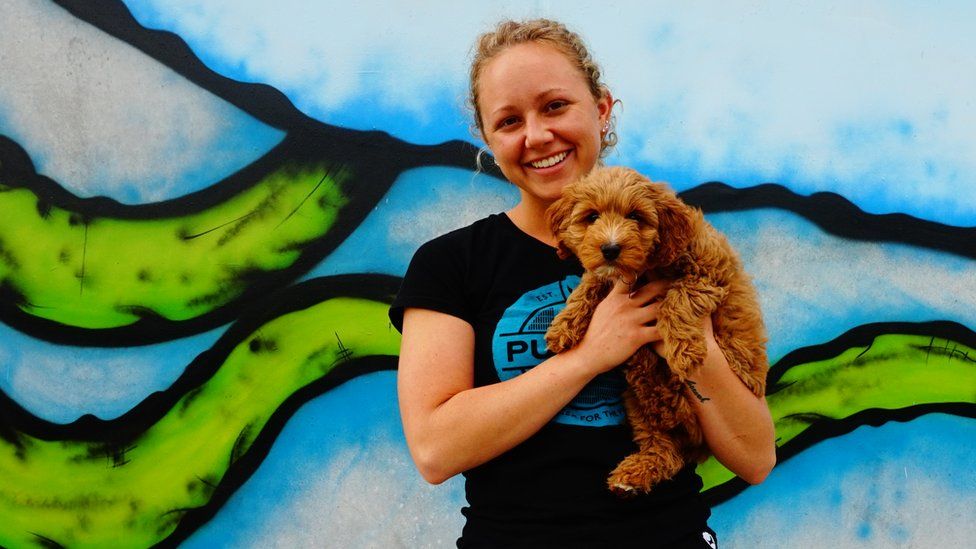'Pawternity' leave - firms with unusual staff benefits
- Published

As anyone who has had a new puppy will understand, 24-year-old Gia Nigro has got her hands full.
Gia, who lives in Columbus, Ohio, is the proud owner of a nine-week-old goldendoodle puppy (a cross between a golden retriever and a poodle) called Rye.
Like any young dog it is going to require a fair amount of training to ensure it becomes housetrained and obedient.
But what can you do if, like Gia, you work full-time, and you don't have any holiday time left to dedicate to your new four-legged friend?
Thankfully for Gia, her employer - Scottish brewer Brewdog - announced a rather unusual new employee perk earlier this year - one week's paid leave for all workers who adopt a puppy or rescue dog.
Unsurprisingly the announcement - which was released to the media in a press release rather than just told to staff - made headlines around the world. Newspaper reports were quick to praise the scheme that Brewdog has dubbed "pawternity" leave.
However, the more cynical may have wondered whether there was more than a whiff of gimmick to Brewdog's unusual new employee benefit. They may further question whether it was unveiled as "clickbait" to draw attention to a press release that also announced that the company had just opened a new 100,000 sq ft (9,000sq m) North American brewery in Columbus.
Not that Gia, who works at the new facility, has any complaints. "The policy gives me the flexibility to choose when to take a fully paid week off with Rye, which I'll be doing next month to get her fully house trained," she says.
And in defence of Brewdog, it has also always been dog-friendly, and allows employees to take their pets to work with them.
While employee perks are nothing new, they have become both more unusual and headline grabbing in recent years. But why exactly are firms offering them?
'Tears of joy'
Last year New York-based online retailer Boxed was praised when its co-founder and boss Chieh Huang announced that the company would contribute to the cost of employees' weddings.
Mr Huang says he was inspired to start the unusual scheme when he saw one of his employees crying at work because he was struggling to cover the cost of his mother's medical bills and save for his forthcoming wedding.
"He basically realised that he was just never going to make it work," says Mr Huang, who was immediately inspired to pay for the worker's wedding, and then introduce the company-wide policy.
"The response was overwhelming," says Mr Huang. "There was lots of yelling, high-fiving, and tears of joy.
"I think that day our employees realised that we understand just how much of a commitment they make to us every day, putting in long hours to make this company grow, and that we're willing to make a commitment to them in return. I really think that resonated with them."
While Boxed is a bit cagey about the details, under the scheme it will pay up to $20,000 (£16,000) for weddings, depending on seniority and time with the company.
So far half a dozen Boxed workers have redeemed the perk, and Mr Huang says there are "lots more on the horizon".
He firmly rejects the suggestion that the scheme was introduced simply to garner publicity.
"There are definitely less expensive ways to get media attention," says Mr Huang. "We definitely do not sit around in a room trying to come up with ideas on how to create buzzworthy corporate benefits."
'Return on investment'
Occupational psychologist Cheryl Isaacs says that having generous employee perks can be a good way for a company to help ensure that it has a contented workforce, and that numerous studies have shown (perhaps unsurprisingly) that happy staff are more productive.
One such recent report into the issue by the University of Warwick found that employee happiness boosted productivity by 12%, while unhappy workers were 10% less productive.
However, London-based Ms Isaacs cautions that the benefits should apply to most employees, and not just a few.
"A deeper question that each individual organisation needs to answer is: does the benefit bring ROI [return on investment']? Will it have any long-lasting benefits for the company?" she says.
Other employee perk schemes that have made the headlines in recent years include Apple and Facebook offering to pay for egg freezing for their female employees, while Netflix allows staff to take up to a year's parental leave.
Meanwhile, US online real estate firm Zillow pays for female employees to post their breast milk if they are working away from home. They introduced the scheme in 2010 after a worker had difficulty getting her container of milk through airport security.
While all these firms say they are trying to help their staff rather than garner positive publicity, Florida-based PR expert Glenn Selig guesses that businesses can often be seeking both.
"Companies can both really mean it - want to improve the lives of their employees, and get their names out there," he says.
"I wouldn't be surprised if in the C suites [at boardroom level] there was some kind of conversation about what kind of benefit can be offered to employees that would also make the company look good, and could generate positive attention."
While Brewdog has a range of staff benefits that don't make the headlines, such as paying staff a guaranteed living wage and generous parental leave, Mr Selig says the "pawternity" scheme is a "really neat idea" from a PR point of view.
"Will it make people buy the beer? I don't know," he says.
"But you might remember it next time you're sitting in a bar and someone mentions Brewdog."
Follow Business Brain series editor Will Smale on Twitter @WillSmale1